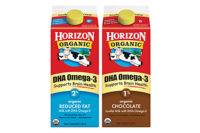Dietitian Kate Scarlata is one of a growing subpopulation of people who suffer from irritable bowel syndrome (IBS). She has devoted her career to help others manage symptoms with dietary modifications. IBS is a disorder in the functioning of the intestines and/or nervous system that leads to chronic abdominal pain, gas, bloating, diarrhea and other GI symptoms.
“Living with IBS can greatly impact an individual’s quality of life,” said Scarlata, a nutrition consultant and author based in Massachusetts.
Experts estimate that IBS affects about 15% of the adult population in Europe and North America. The prevalence may be underestimated, however, since many with IBS symptoms are not formally diagnosed.
Carbs might be the trigger
Of the 15% with IBS, about 75% are sensitive to a group of short-chain carbohydrates consisting of fermentable oligo-, di- and mono-saccharides and polyols (FODMAPs for short) including lactose, fructose, fructans/galactooligosaccharides and polyols. A trial of a low-FODMAP diet can ferret out offending ingredients. All FODMAPs are eliminated from the diet for two to six weeks. Then they are reintroduced (one by one) as GI symptoms are tracked in order to determine an individual’s specific sensitivities. The person then avoids foods that are high in the FODMAPS that cause symptoms. Research indicates the low-FODMAP diet manages symptoms in three out of four people with IBS.
All fructo-oligosaccharides (FOS), including inulin, are eliminated during the low-FODMAP diet trial.
“In my experience working with IBS, the majority of patients have sensitivity to inulin, including myself,” said Scarlata.
Inulin is a soluble prebiotic fiber that stimulates the growth of certain probiotics (such as bifidobacteria) in the gut. Humans lack the enzymes to digest inulin, so inulin passes through the small intestine undigested and is fermented in the colon by resident bacteria, producing gas and other byproducts and drawing water into the colon.
“Healthy people seem to tolerate this quite well,” according to Jane Muir, Jaci Barrett and Amanda Banfield who are FODMAP researchers from Monash University in Australia. “Anyone can experience bloating and gas after consuming inulin/FOS, but individuals with IBS are particularly sensitive to the production of gas in their intestine which sometimes causes unbearable pain and discomfort.”
The amount of inulin/FOS that can cause discomfort in those with IBS can be quite low. According to the Monash researchers, 1 to 2 grams can produce symptoms, but this dose would be hardly noticed in a healthy person, they said. A study investigating the effects of inulin consumption published in the Journal of the American Dietetic Association (2010) bears this out. The authors concluded that doses up to 10 grams per day of native inulin and up to 5 grams per day of oligofructose were well-tolerated in healthy young adults.
Inulin as an ingredient
Because inulin has many upsides as a food ingredient, it is being added to more and more products including granola, cereal, bread, milk, yogurt and kefir. The widespread use of inulin is notable for several reasons. Inulin — and FODMAPs as a whole — have a cumulative effect. Small amounts may be tolerated, but GI symptoms can develop when consumers surpass their threshold. Also, consumers who are sensitive to inulin avoid processed foods and beverages that list inulin, chicory root fiber or FOS as ingredients. It is likely that more will shun inulin as awareness of the low-FODMAP diet increases.
So, what’s the dairy industry to do? Scarlata suggests processers consider alternate ingredient options. To cater to IBS sufferers, the researchers at Monash suggest exploring lactose-free products that are free of inulin/FOS ingredients and are not high in high-FODMAP fruits and ingredients (that is, honey, mango, apple and high-fructose corn syrup).
Yogurt may be an exception. The researchers at Monash have observed that some people with IBS, while following the low-FODMAP diet, can tolerate inulin/FOS in some yogurt products, possibly because their “background” diet is low in FODMAPs.




